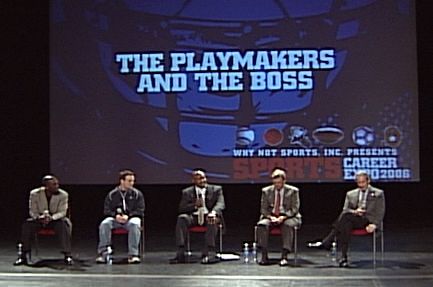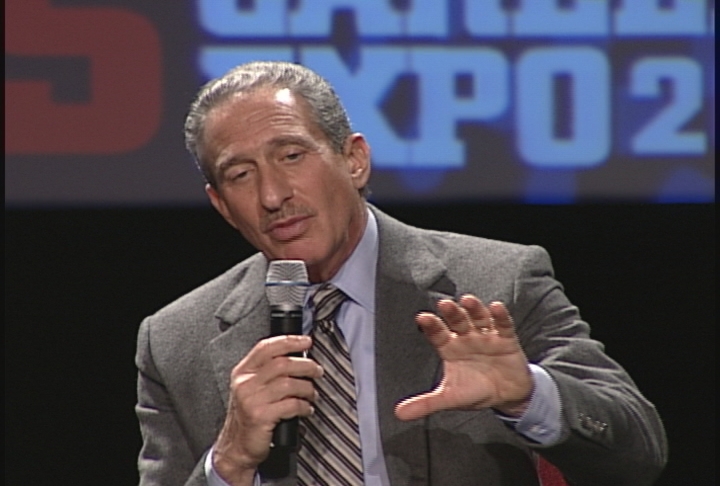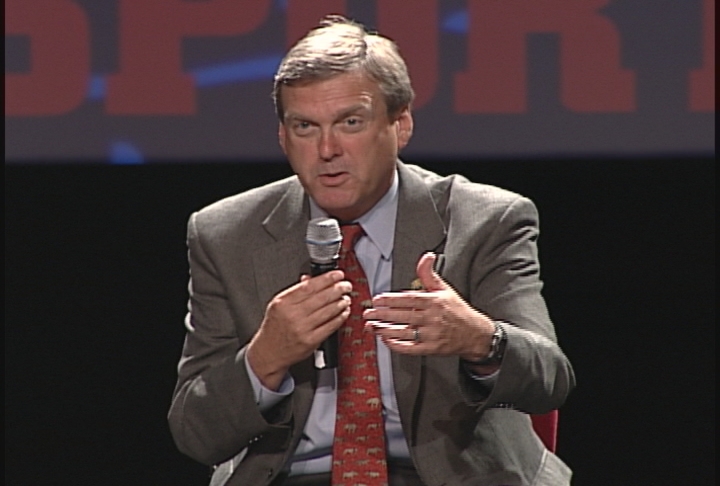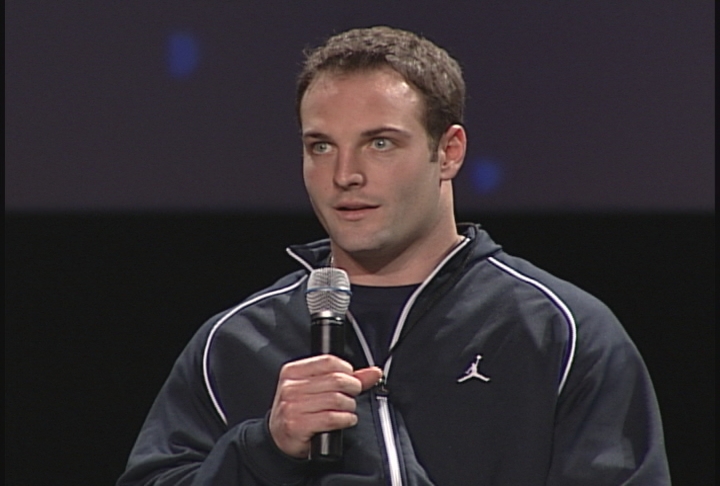9480 Virginia Center Boulevard
Suite 225
Vienna, VA 22181
davidlis
- Home
- About Integritas
- Ask the CEO Columns
- Ask the CEO Video
- Playmakers and the Boss
- Hispanics in the Bush White House
- Hispanic Leader Profiles
- Hispanic Success Stories (English)
- Spanish Language Articles
- Careers & Business Ethics
- Leadership/Management
- Brand Strategy
- THE FACTS ARE....
- Business Links
- Technology Links
- Contact/Mailing List
Playmakers and the Boss
PLAYMAKERS AND THE BOSSSM
Through this signature program, Integritas Communications produces live events, creates and distributes video and feature articles from these events, expanding on the Ask the CEOSM concept.
In a single forum, professional athletes and business leaders are brought together to demonstrate how the skills of the successful athlete, and the abilities of all successful people to overcome adversity translate into success off the field in business and in life.
A video feature of this event will soon be added in this space.
Playmakers and the BossSM: Super Bowl Lessons on Leadership from a Billionaire Owner, Miami Dolphins CEO and NFL Athletes
By David Liss

"Being fired may be the best thing that ever happened to Arthur Blank."
Today, Arthur Blank is the billionaire co-founder of Home Depot and the owner of the Atlanta Falcons.
His decision to create Home Depot, his success as an entrepreneur, his success as a leader was possible ONLY after he was fired from a another job.
“I got fired in 1978,” remembered Arthur Blank. "Along with my partner (Bernard Marcus). My partner being the guy I founded Home Depot with. He was the President and CEO and I was the number two. We were running the most successful conventional chain of home improvement stores in the U.S. There was a political situation with the man who was the chairman of the parent company."
Today Arthur Blank has a net worth of over $1.4 billion. The corporation he co-founded, The Home Depot, now has more than $90.8 billion in annual sales, $5.8 billion in earnings and 350,000 employees in over 2,147 stores.
His success with Home Depot enabled him to buy the Atlanta Falcons in 2002 for $545 million. Today, Forbes Magazine values his team at $796 million. He is also Chairman of The Arthur M. Blank Family Foundation. The Foundation, along with Arthur Blank's personal giving, has donated over $220 million to charity. Not too bad for a kid raised by a working class family from Queens, New York.
Blank continued, “These things happen. We could have felt...how could this have happened to us. We sat down for several days and thought about if we had our lives to live over from a business perspective, what would we do? That was the beginning of our company. The success of our company…was a question of taking something that was a bad situation and turning it around and making it something that is very positive. I retired from Home Depot with Home Depot being the second largest retailer in the world.”
Blank spoke as a participant of a "Playmakers and the Boss" panel held as part of Super Bowl XL events in Detroit hosted by The Why Not Sports "Sports Career Expo." The event was held at Cass Tech high school.
Joining Arthur Blank on this panel were: Joe Bailey, CEO of the Miami Dolphins; Ike Reese, Atlanta Falcons Linebacker (currently with the Philadelphia Eagles' Eagles Television Network), and Wes Welker, a Miami Dolphins Wide Receiver now playing for the New England Patriots. Cliff Russell, host of America's Black Journal on Detroit Public Television moderated the panel. Brian Gallagher, President and CEO of The United Way of America introduced the session.
Panelists spoke about the skills needed for success on the field as athletes and off the field in business and life.
The simple truth, is as Arthur Blank explains, “Throughout life we are all faced with trauma and making difficult decisions. We all are faced with a road that takes us in a different direction than we would have liked or planned for. Each of us must determine what to do to take advantage of the disadvantages that happen in our lives. What you do to take advantage of those situations to better your life are critical for shaping your life and your future.”
His attitude and actions to overcome adversity are a critical part of his strength as a leader.
What is a leader? What is leadership?
Each of these panelists are leaders on the field as athletes and off the field in business because they have the determination to pursue the work they enjoy most and the lives they lead with passion and drive.
But what does it mean to be a leader? What does a leader do?
Everyone has leadership responsibilities. Whether it’s deciding a path for yourself, helping your family, managing other people, or building or running a company – you are a leader.
To Ike Reese, “A good leader is not the guy that tells you you are right all the time. He’s not the guy that tells you that you are doing everything okay. A good leader is the guy that’s able to make the tough decisions, who’s able to motivate his guys around him, his players, his teammates, and who is also able to be firm with them when he needs to be, but in a way that they appreciate it, in a way that they are not offended by it, so they don’t become defensive about it. You've got to be able to correct people in a way that they accept it. That's what the good leaders do.”
Joe Bailey builds on this definition. As CEO of Dolphin Enterprises, Joe Bailey manages all businesses owned by Wayne Huizenga, the Dolphin’s self-made billionaire owner. He also oversees the $400 million renovation of Dolphins Stadium. Before taking on this job, Bailey was an executive recruiter with Russell Reynolds Associates where he recruited CEOs for both the NFL and Fortune 500 companies.
From his experience recruiting men and women to lead major corporations and pro sports teams, he created a framework for what it means to be a leader. “When we’re recruiting you take a look at leadership skills because you are recruiting for CEOs and those types of people. It didn’t make bit of difference of whether a person had charisma or not. A lot of people that have charisma aren’t necessarily great leaders. It didn’t make any difference what they looked like. They all had 5 common characteristics. If you can apply these characteristics against people that you work with or work for I think that this will be quite helpful."
The first is that they all have a huge capacity for work. They all enjoyed work, but nevertheless they had a huge capacity for work.
They knew exactly where they wanted to go.
They had a vision and they had the ability to sell that vision to people both internally and externally.
They had the self-confidence to hire the best people and surround themselves with the strongest managers they could possibly find. Sometimes people that were actually stronger than they were.
They viewed their position as a privilege and not as necessarily a right. This is especially true for effective leaders who have stayed in their positions for a long time.
True leaders are totally trustworthy. You can trust their word that they would tell you exactly the truth no matter what kind of situation you are in.
What does a CEO do?
In Arthur Blank's words, “The most critical thing that the owner has to do is to establish a set of values and principles for the organization, establish the culture for that organization and hire the best people. As a leader, you have to bring in people that represent and live those values and principles and make sure that everyone works together with sameness of purpose.“
Adding, “Whether it's the General Manager, coaches, players, or the front office staff, I set the tone, set the culture for the organization, give them financial backing and emotionally support them.
The importance of “passion”
For each panelist, success is not possible, leadership is not possible, nothing is possible without passion. “It’s the passion. Going out there and giving it your all in whatever you do,” said Wes Welker.
As important as passion is, success requires more than just passion alone.
Successful leaders, “Have a values system, have a set of principles they believe in. Successful leaders always focus on their customers or fans, are always good listeners, always listen to their associates (employees), and both listen to and understand who they are supporting,” Blank explained.
It is tough to build and maintain passion for a job you hate in a career that does not reflect your your core values, interests or career goals. The bottom line is that to be successful, passion alone is just not enough. It takes a very focused and directed kind of passion.
Arthur Blank explains, successful people, “Find an area to be passionate about, because without that passion, you will never be a good leader....You must understand your own wiring and what it is that turns you on. You will be very successful no matter what your business may be..., on the field or off the field, if you get in touch with those feelings and that passion.”
Sadly, many people get stuck in careers they thought they would love, working for companies they really dislike. “After passion the second most critical thing is to understand yourself. Understand the values and principles that you have and join an organization, an industry, or a business that matches up with your values on life, that you want to be a part of. Because you can join an industry, a business that does not match up well and reflect your values. You can love an industry or you can love a business and join the wrong business or company within an industry, suddenly finding yourself going to work each day..., not having a good time, getting headaches every day, because that organization operates in a way that does not reflect or fit your personality, your style or your own system of values. To be successful, each person must get in touch with who and what your values are and fit yourself in an organization that feels right to you,” Blank concluded.
His values are clearly defined. This is a man whose success is based on his values. In Arthur Blank's own words, “...I am a builder, an achiever, I want to add value, give back to the community, make a difference in people’s lives. If I didn’t own an NFL team I would be doing something else that is in keeping with those values.”
Listen to your gut
"Each of us has a gut instinct, a feeling, a vibe, a voice – something deep inside of us that tells us what's right or wrong. Often, the bad decisions that we make, in our careers, in business and in life, come from not listening to these gut feelings," Blank reminds. Continuing, "As you think about your life, how many times have you gotten yourself in trouble by ignoring what your gut was screaming as loud as it possibly could to tell you?
“There is a wee small voice that lives inside of all of us that only talks to ourselves. It doesn’t talk to our spouse, doesn’t talk to your kids, doesn’t talk to your mothers or fathers, doesn’t talk to your kids or your friends. At the end of the day, when you are making critical decisions about what you are doing for the rest of your life or for the foreseeable future, listen to that voice. That voice is very powerful,” Arthur Blank explained.
Putting it all together: from towel boy to CEO – Joe Bailey's story
Joe Bailey's road to becoming CEO started when he was 13 years old – as a towel boy with the Dallas Cowboys.
Bailey was born and raised in Washington, DC. His father was a doctor, and one of his patients was Clint Murchison, Jr. In 1960, Murchison bought the expansion franchise for the Dallas Cowboys and appointed Bailey's dad as team cardiologist. Eventually, Dr. Bailey asked Cowboys President Tex Schramm about a summer job for his son. “And from 1961 to 1964 I, worked in the summer training camps. Obviously I didn’t exactly deserve that, but by the same token, that is what I did. I met all those wonderful players and coaches.... I really learned about the business,” remembered Bailey. Adding, “...It wasn’t really business, it was fun and it was a sport, which it still is for me today.”
“I had started so young in the NFL, so that by time I had finished working for the Cowboys, after 19 years in the league, by 1989 I had virtually held every position in a football club. Then I went on to run The World Football League,” Baliey explained. “After five years, my career was all about professional football. I did not want to repeat what I had done before. And did not want to keep going on a treadmill. I took an assessment of my skills and abilities, and even though I did not know a soul in the business, I got into executive recruiting (with Russell Reynolds Associates). It was a totally different kind of business. 11 years later I had learned so much about the value of personnel, people,and industries (ranging) from financial services to technology. It was an incredible learning experience for me,” he added.
Bringing his story up to date, “I was doing a search for Wayne Huizenga for a coach and CEO (of Dolphin Enterprises). I got the head coach, Nick Sabin, and didn’t do a very good job with the CEO search – so I volunteered. Now I am the CEO.”
Not a bad gig for a former towel boy. Starting out at the bottom can be the best way to get to the top.
“The point is that I did make a change, a mid-career, mid-season change in direction. If you really know yourself, you can make a career change. Now I’m back full swing to the profession of professional football, but along the way it forced me to really think in terms of what my skills and abilities really are. We are all wired a bit differently. And so the point is if you really know yourself and what you can and want to do its quite helpful,” Bailey concluded.
Bottom Line:
Whether or not you become a billionaire, it's your responsibility to enjoy what you do in life, to make decisions every day to pursue your passions, determine your principles and understand your values – working in a business that reflects these qualities for you. Regardless of which path you choose, make it your decision, not influenced or limited by the expectations that any one else may have of you.
Everyone needs words to live by. Advice that inspires you to move ahead when times are tough, and to keep focused when everything in your life is out of control.
Regardless of their success, these panelists are basically no different than anyone else. Like most successful people, each has advice they were given that they use to guide and shape their lives every day, and to make tough decisions in hard times. Each explained what this advice was for them and how they use this wisdom to build a successful life.

Arthur Blank - “My best advice came from my mother who is still alive today. She said, pay attention to your principles and values. Always surround yourself with the right kinds of people. People that believe in the same kinds of things that you believe. And, whatever you do, in business or in life, you will be very successful. That advice has always stayed with me. For me it’s worked.”

Joe Bailey - “The best advice I got was from a person I consider my mentor, which was the President and General Manager of the Dallas Cowboys (Clint Murcheson). He said, “Do what you really enjoy doing, don’t do something and (then) have to look back at the end of your professional career and ask yourself ‘why didn’t I try this.’ By the same token, in order to pursue what you have passion for, you may have to sacrifice a bit. But, if you ultimately know that it is that will fulfill your life, then you should always go after it.”

Wes Welker - “My dad always told me, 'Never have regrets about anything.'” For me, every time I step out on the field I don’t want to have regrets on any play from a lack of effort and what I bring to the field – as far as my effort is concerned. I don’t want to have regrets on what I could have done. (I) don’t want to have regrets on any anything. Don’t want to worry about that block you could have gotten or missed, you just want to go ahead and get that block. Never have regrets on whatever you do in life.”

Ike Reese - 'Whatever you do in life make sure you have fun doing it. Make sure you enjoy doing it.' What we do for a living, once it becomes work the fun is out. I enjoy what I do for a living and that is why I have been able to last as long as I have.”
Ike Reese - “...My tenth grade math teacher said “Never be content with anyone else’s definition of you.” We all are individuals. We all have our wants and personalities. We control our own destiny and what we do with our lives. Never allow anyone to put limitations around you. We control how far we can go in life, the things we accomplish with our lives. Whether it is making a billion dollars, or enjoying what you do for a living, regardless of what it is, don’t left yourself be defined by the expectations others have of you. I enjoy what I do for a living and I enjoy the decisions that I make and I make them because I choose to make them and not because of someone telling me about their perceived limitations of me.”

Cass Tech High School - Detroit, Michigan
Copyright Integritas Communications, Inc. 2007. All rights reserved.
9480 Virginia Center Boulevard
Suite 225
Vienna, VA 22181
davidlis
